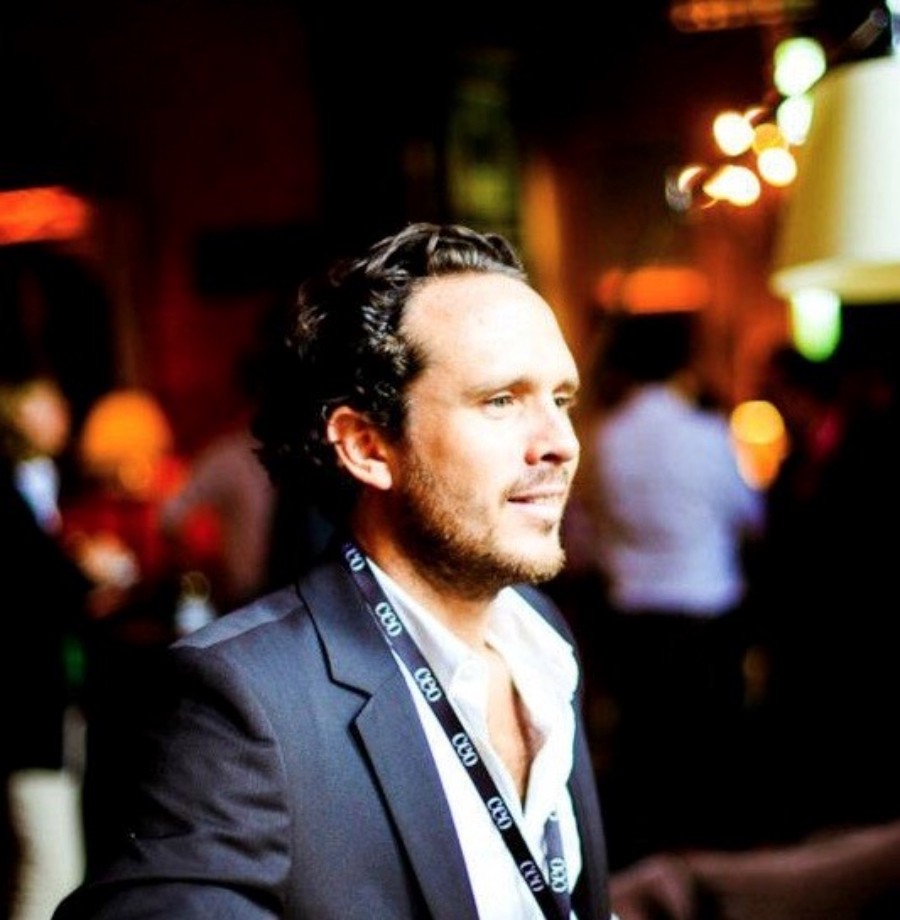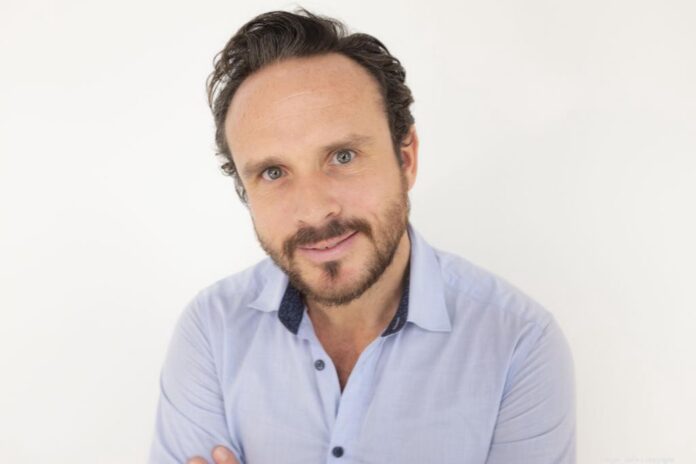Christophe Garnier: Five Strategies Our Company Is Using To Tackle Climate Change & Become More Sustainable
Help children fall in love with the planet: Real-life situations are so important. Introduce them to the great outdoors. Awe them with experiences of new and different places and situations, so they can see for themselves. Take them to the beach. Teach them the importance of reduce, reuse, recycle.
As part of our series about how companies are becoming more sustainable, we had the pleasure of interviewing Christophe Garnier.
Christophe Garnier is an industry pioneer with more than 20 years of experience founding, leading, and growing successful companies around the world. In 2018, he launched a coworking aggregator and booking platform called Upflex. Today, Upflex is a proptech company with a tech-forward workspace management solution and a world-class network of flexible workspace, helping forward-thinking companies, from startups to Fortune 500s, make the shift to flexible work and reduce the office’s environmental impact.
Thank you so much for doing this with us! Can you tell us a story about what brought you to this specific career path?
I’ve been working in tech — and in fast-growing startups — since 1999, when I moved from Paris to San Francisco to co-lead U.S. expansion and development for a European mobile tech company, Mobileway. After four years there as a Senior Business Development Manager, I joined another European mobile tech company, Enpocket, as the Senior Director of Business Development. My time at these two companies was invaluable. It gave me the skills and confidence I needed to eventually launch my own mobile tech company. In 2005 I moved to New York and created mSmart, an early player in the world of mobile marketing, and in 2008 I created Totsy, the first flash sale e-commerce platform for parents, for which I raised over $30M and created 5 million accounts. In 2013, I brought my tech and entrepreneurial background to commercial real estate and launched Spark Labs, a flexible workspace company and a sort of global networking community for entrepreneurs looking to break into U.S. markets.
After five years, my longtime business partner Ginger Dhaliwal and I founded Upflex. That’s where we both are still today, and where we see the future. Upflex is like an Airbnb for flexible workspace: We help companies break away from the confines of the traditional office to find, book, and manage workspace all around the world. We provide them with a data-rich workspace booking and management platform and a network of thousands of bookable flex workspaces in more than 80 countries, and we partner with everyone in this commercial real estate ecosystem — from landlords to real estate brokers to coworking space operators to, of course, employers, from Schneider Electric to Autodesk — to make flexible work more seamless and more sustainable, from a business standpoint and from an environmental standpoint.
What is the mission of your company? What problems are you aiming to solve?
The pandemic jump-started the idea of flexible work worldwide, but enabling this more effective, more flexible, more sustainable way of working has been our mission since we started Upflex in 2018.
Work isn’t meant to happen in just one way, in one kind of space. We believe it’s time to change the dynamics of work by changing the places where it happens. It can be more flexible, more efficient, and more intentional — and it can be better for people and better for the planet. After all, the built world is responsible for 40% of the world’s carbon emissions. Building new office space doesn’t make sense when there is so much incredible space out there. It doesn’t make sense to run HVACs and lights and all kinds of other energy expenditures in buildings that were constantly underutilized even before the pandemic. We wanted to build a way for this whole industry to pool its resources, cut its own costs and energy expenditures, help its employees find closer-to-home workspaces to reduce commutes, and get access to even better workspaces than they already have.
Can you tell our readers about the initiatives that you or your company are taking to address climate change or sustainability? Can you give an example for each?
We’re doing a few things. First, as I mentioned, we exist in part to help other companies reduce their carbon footprint. About 40% to 60% of desks were being used at any given moment, even before the pandemic. At traditional downtown offices, that stat certainly isn’t getting better. We’re helping employers confront and eliminate that inefficiency. And at companies that are using Upflex to power flexible work, employees choose workspaces that are convenient for them, reducing commute times. This change made on a global scale could reduce greenhouse gas emissions by hundreds of millions — even billions — of tons per year.
Our company, in particular, is fully flexible for these reasons, and we’re also working on other ways to achieve carbon neutrality. One of our carbon offsets is our partnership with the nonprofit Trees for the Future. Through that partnership, a tree is planted with every desk booked on our platform, and so far, we’ve planted tens of thousands of trees. We are chipping away at our goal of one million, which could absorb approximately 24,000 tons of CO2 annually. Trees aren’t the whole answer to climate change, but they are certainly part of the answer.
How would you articulate how a business can become more profitable by being more sustainable and more environmentally conscious? Can you share a story or example?
Well, there are several ways. Research on workspace shows that working out of buildings with environmental certifications and energy efficiency modifications means lower utility expenses, operations and maintenance expenses, and overhead. That’s a small one that can make a big difference.
But in the age of the Great Resignation, quiet quitting, and a growing talent shortage, let’s talk about talent acquisition and retention: Turnover is a massive strain on a company’s bottom line. But study after study shows job candidates want to work for a company with values that reflect their own. In one recent study, nearly half of the employees admitted they would take a pay cut to work for an environmentally conscious company.
This is especially true of younger talent — millennials and Gen Z — who are expected to make up 75% of the workforce by 2025. Companies that do get a serious, genuine environmental sustainability policy in place will have a competitive edge. Companies that don’t think about or value these things will have an increasingly tough time competing for great candidates.

The youth-led climate strikes of September 2019 showed an impressive degree of activism and initiative by young people on behalf of climate change. This was great, and there is still plenty that needs to be done. In your opinion, what are 5 things parents should do to inspire the next generation to become engaged in sustainability and the environmental movement? Please give a story or an example for each.
- Educate: Start young and help children recognize the massive impact humans have on the natural world
- Lead with compassion: Our kids watch everything we do, even if we don’t notice. We are their role models, and we must lead by example. Instill in them to live with compassion for nature.
- Help children fall in love with the planet: Real-life situations are so important. Introduce them to the great outdoors. Awe them with experiences of new and different places and situations, so they can see for themselves. Take them to the beach. Teach them the importance of reduce, reuse, recycle.
- Start in your own community: Before making a difference globally, you need to be engaged locally. Bring your kids with you and get involved in service projects in your community and show them they can make a real difference in the world.
- Leave no trace: Again, lead by example. When you are with your kids outdoors, pick up litter. Don’t leave a mark. Do your part to protect nature.
Do you have a favorite life lesson quote? Can you tell us how that was relevant to you in your own life?
Outside of the office, I love to surf. I was born on the French Coast, I grew up surfing, and now I’m in San Diego. The ocean brings me a sense of peace, no matter how crazy my days at work are. I surf because it makes me a better person; it clears my head and allows me to reset. I just love the ocean. So maybe that plays into why I’m so passionate about building a sustainable company and wanting to help others do the same.
And in a way, surfing is similar to working with a startup. Taking the wave is one thing, but staying on the wave is another. In the startup world, you’re creating something. You have to make it stand. When you’re surfing, you’re constantly refining and optimizing in order to take that wave longer and faster. At the end of the day, it’s all about resilience.
What is the best way for our readers to continue to follow your work online?
Follow me on LinkedIn: linkedin.com/in/cgarnier, and look for Upflex on social (LinkedIn, Twitter, Instagram). And I’d encourage any company leader out there who is interested in rethinking your workspace strategy to connect with me or one of our workspace solutions advisors at Upflex to talk about how we can help.
This was so inspiring. Thank you so much for joining us!
Christophe Garnier: Five Strategies Our Company Is Using To Tackle Climate Change & Become More… was originally published in Authority Magazine on Medium, where people are continuing the conversation by highlighting and responding to this story.


